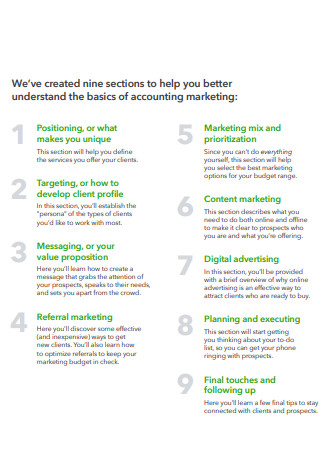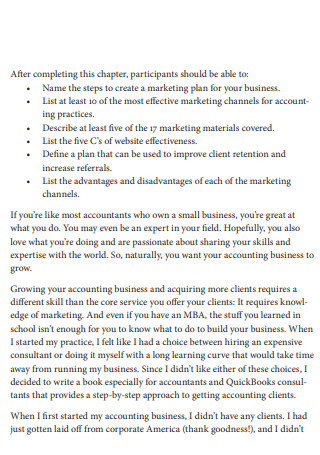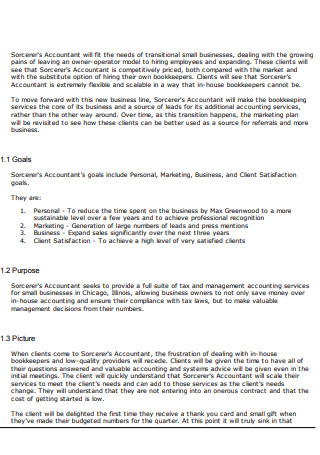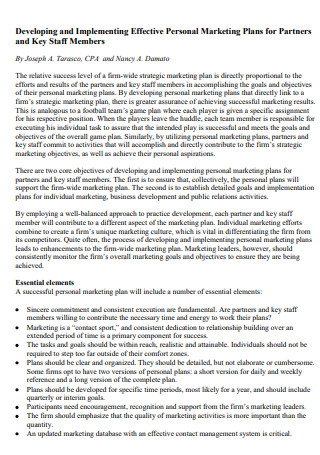4+ SAMPLE Accounting Firm Marketing Plan
FREE Accounting Firm Marketing Plan s to Download
4+ SAMPLE Accounting Firm Marketing Plan
a Marketing Plan?
Benefits of Marketing Plans
Strategies for Accountants’ Marketing
How To Find Clients For Your Accounting Firm
FAQs
What is an accounting proposal?
How do you compose an accounting proposal?
What is invoice number?
What Is a Marketing Plan?
A marketing plan may be incorporated into a larger company plan. A solid marketing strategy is the foundation of a well-written marketing plan, allowing for achieving marketing objectives. A marketing strategy may contain a list of actions, but it is of little use to a business without a solid strategic foundation. Statistics indicate that more than 80% of our new clients come directly or indirectly from an existing individual or company client referral.
Benefits of Marketing Plans
A marketing strategy is essentially a blueprint that describes the methods you will employ to convince clients to purchase your products or services. It functions as a road map for your marketing strategy, techniques, marketing activities, expenses, and anticipated outcomes. It must be specific enough to include small firms‘ steps to achieve their objectives. Whether running a tiny firm or expanding a large one, you must still develop a marketing strategy. It has a surfeit of advantages, including the following:
Strategies for Accountants’ Marketing
Whether you operate an accounting firm or are self-employed, providing your services is only half the battle; you must also market them. The marketing process is significantly more complex than it was in the past, and the rate of change is accelerating, making it challenging to keep up. We have gathered a list of some effective marketing strategies for accounting firms.
1. Spend money on outbound marketing
Outbound marketing is the conventional method of engaging with prospective new customers. In today’s marketing climate, intrusive procedures such as cold calling have been supplanted by more subtle approaches such as advertising on community pages and in relevant local publications. When you’re a local business, unconventional thinking can often pay off. For example, sponsoring a local children’s football team can be relatively inexpensive, but consider the number of parents present at every game. How many may require an accountant or know someone who does? If your name appears on their child’s shirt, you will likely be their first choice.
2. Enhance your social networking presence
Regularly posting engaging scope on your social media pages is one of the simplest and most cost-effective methods. As a bare minimum, include your current contact information and a link to your website so that people can find you. However, to make social media a more effective marketing tool, you could share news updates, thought leadership content demonstrating your sector expertise and customer success stories that increase awareness of your services. LinkedIn is an excellent starting point. It attracts a professional audience, and clients can leave you valuable, publicly visible recommendations.
3. Develop a marketing plan and track marketing metrics
Continuing your marketing efforts without a clearly defined strategy is considered a “rookie mistake.” It may be challenging to find the time to sit down and create a marketing plan for the month, quarter, or year, but doing so is one of the most brilliant things you can do. Also, if you’re attempting to determine the efficacy of your current marketing efforts, you must monitor key marketing metrics. Simple metrics such as website traffic and engagement will reveal the number of people interacting with your business online. And to determine whether these visits result in more customers, you can examine your conversion rate to decide how effective your marketing is at attracting more paying customers.
4. Attract customers by means of inbound marketing
Intent on avoiding intrusive advertising? Instead, you could try inbound marketing. Instead of overtly promoting your services, inbound marketing attracts new customers by providing them with a helpful resource. As we explain in our article about inbound marketing, it is similar to a tasty bait that entices potential clients to learn more about what you do. You could, for instance, share your accountancy knowledge in a blog post titled “how to complete your self-assessment tax return.” Once you’ve persuaded people to click, you can direct them to your services page. Even if they choose not to seek assistance at this time, you are still increasing brand recognition for when they may require assistance in the future.
5. Consider content marketing.
Inbound marketing relies heavily on content marketing. If done correctly, it is mutually beneficial for you and your reader; you will provide them with engaging content, and they will want to learn more about what you do. You can write blog posts, newsletters, Facebook posts, listicles, Q&As, and quizzes, to name a few examples, on accountancy-related topics or a wide variety of other subjects. If you lack belief as a writer, you could hire a freelance copywriter to create content for you. They will ensure that you have an abundance of insightful, well-written, and SEO-focused range to publish on your website, social media, and newsletters.
6. Keyword-optimize your online content
SEO, or search engine optimization, is part of the most effective marketing strategies. The goal is to have your content appear near the top of a search engine’s results so that it is one of the first results people see. And, given that 75% of Google users never click past the first page, it’s a crucial aspect of ensuring that your marketing efforts are seen. Try to include search terms that your customers use, such as ‘accountants in [your city]’ and ‘payroll assistance.’
7. Develop a newsletter
Keeping people informed of your activities is a great way to ensure that they think of you first when they need an accountant. A newsletter is an excellent way to maintain brand recognition among existing and potential customers. You can share any business updates, special offers, timely news stories, or relevant advice and encourage readers to see your website for more information. Include a call-to-action at the end of your blog posts and news articles to encourage people to sign up for your newsletter, so they’re always the first to hear your insightful take on the news. Consistency requires that you commit to a regular newsletter distribution schedule. However, people’s inboxes are already full, so skip if you don’t have anything genuinely relevant or valuable to add in a week or month. Always prioritize quality over quantity so that people do not look for the “unsubscribe” button. Again, paying attention to your newsletter’s metrics will help you determine which strategies are most effective.
How To Find Clients For Your Accounting Firm
Your company will almost always require new customers. The most effective method for locating them is a proactive approach. The rules of marketing are rapidly evolving. Customers can be found in more locations than ever before. Some of the channels and methods you previously utilized may no longer be effective. Consider the optimal approach carefully and maintain your concentration. Here are five ways to expand and improve the quality of your client list.
1. Determine your ideal clients
Not all customers and prospects are equal. You can probably divide your existing customers into three categories: excellent, average, and poor. There may be additional factors to consider. Before pursuing your ideal clients, you must understand who they are. There are occasionally trade-offs involved. A prospect’s inclusion on the list is not always based on financial factors. You may be entering a new field of expertise. You may be willing to work for less lucrative clients while establishing your reputation. Or, if your company has a specialized skill, you may be able to charge more. Pursuing new clients in your area of expertise could be a natural and lucrative endeavor for you.
2. Partner with other qualified and reputable specialists
Your clients may already be utilizing the services of other companies. Even if these are not your firm’s areas of expertise, you must assist them with referrals. Consider establishing or strengthening business alliances with other reputable professionals. Excellent attorneys, investment advisors, technology consultants, and recruiters can assist you in serving your clients. Additionally, you may receive referrals from them. It may also be advantageous to establish non-competitive relationships with other reputable businesses. However, ensure that you are not in direct competition. If you are shifting your company’s focus, you could form a partnership with general bookkeeping or payroll firm. They could handle routine tasks while you begin to specialize in higher-value services.
3. Don’t be afraid to request references.
It isn’t easy to find a better salesperson than a happy customer. You do not have an exclusive relationship with your clients. They interact with businesses of every size and shape. Their endorsement of your company enhances your reputation. Regarding referrals, avoid taking a “wait and see” stance. Take the initiative. Request that your best clients spread the word about your company. Remember to utilize professional networking services such as LinkedIn for endorsements and recommendations. Include reviews on your website. Some companies use a more structured referral incentive program. These provide defined discounts or benefits to existing customers in exchange for referrals.
4. Upsell complementary services to your current customers
Offering extra services to existing clients can help you grow your business. Explain why your firm can better serve customers if they use your competitors for the services you also provide. But take your time, choose your moment, and create a one-of-a-kind meeting, presentation, or workshop. What if your customers are already well taken care of? Look for ways to help their spouses, friends, and coworkers with additional services.
5. Discover how to network more efficiently
Networking events are vital if you learn how to maximize your participation. Even in today’s digital era, in-person events provide excellent possibilities to meet new prospects. A well-executed face-to-face interaction is still challenging to surpass. Even more successful are networking events for businesses that serve other industries. It is essential to be well-prepared before attending networking events. Before attending, get as much information as possible on the other guests. It might be feasible to obtain a list of attendees in advance. Consider what would make your company valuable to these prospective clients. Ensure that you meet crucial individuals and follow up subsequently.
FAQs
What is an accounting proposal?
Accounting proposals are submitted in response to a request, abbreviated as RFP. This proposal requests funding or attempts to convince potential clients or customers to support the company financially.
How do you compose an accounting proposal?
Create a project synopsis or executive summary and a concise project overview. Explain to the evaluators or client why your accounting service is the most suitable for the contract.
What is invoice number?
An invoice number is a unique code systematically assigned to invoices. Invoice numbers ensure that income is accurately documented for tax and accounting purposes. In addition, they provide tracking payments and manage overdue debts.
Every firm must have a comprehensive marketing plan to have a direction for their business. A marketing plan is necessary for an accounting firm, just as it is for any other company, to establish a course of action for attracting new prospects and clients. Creating a marketing plan may appear complicated, but with these ideas, you’ll have no trouble: establishing your goals, choosing your targets, determining your budget, and being consistent. You should be able to design your marketing plan for your organization now that you are familiar with the efficient marketing plan recommendations and examples for accounting firms.





